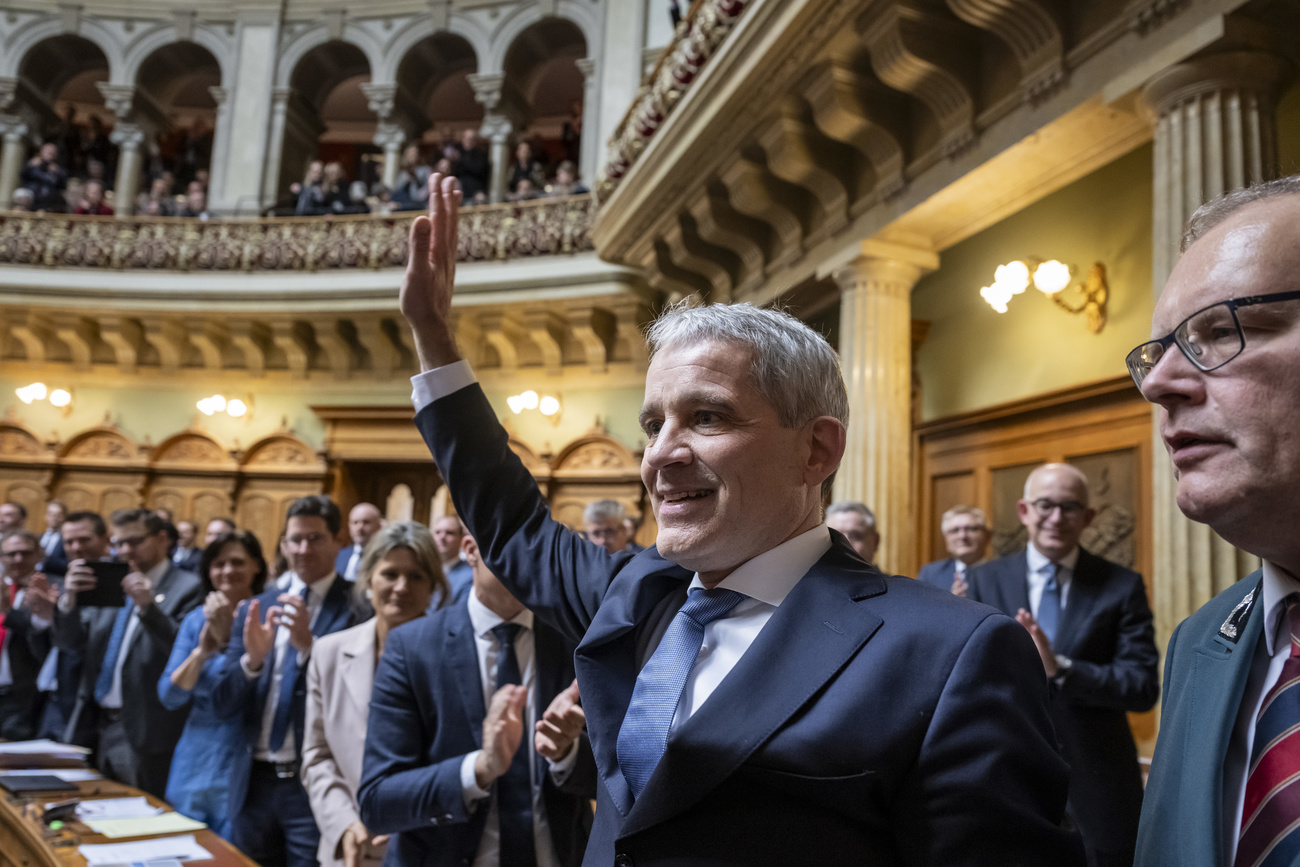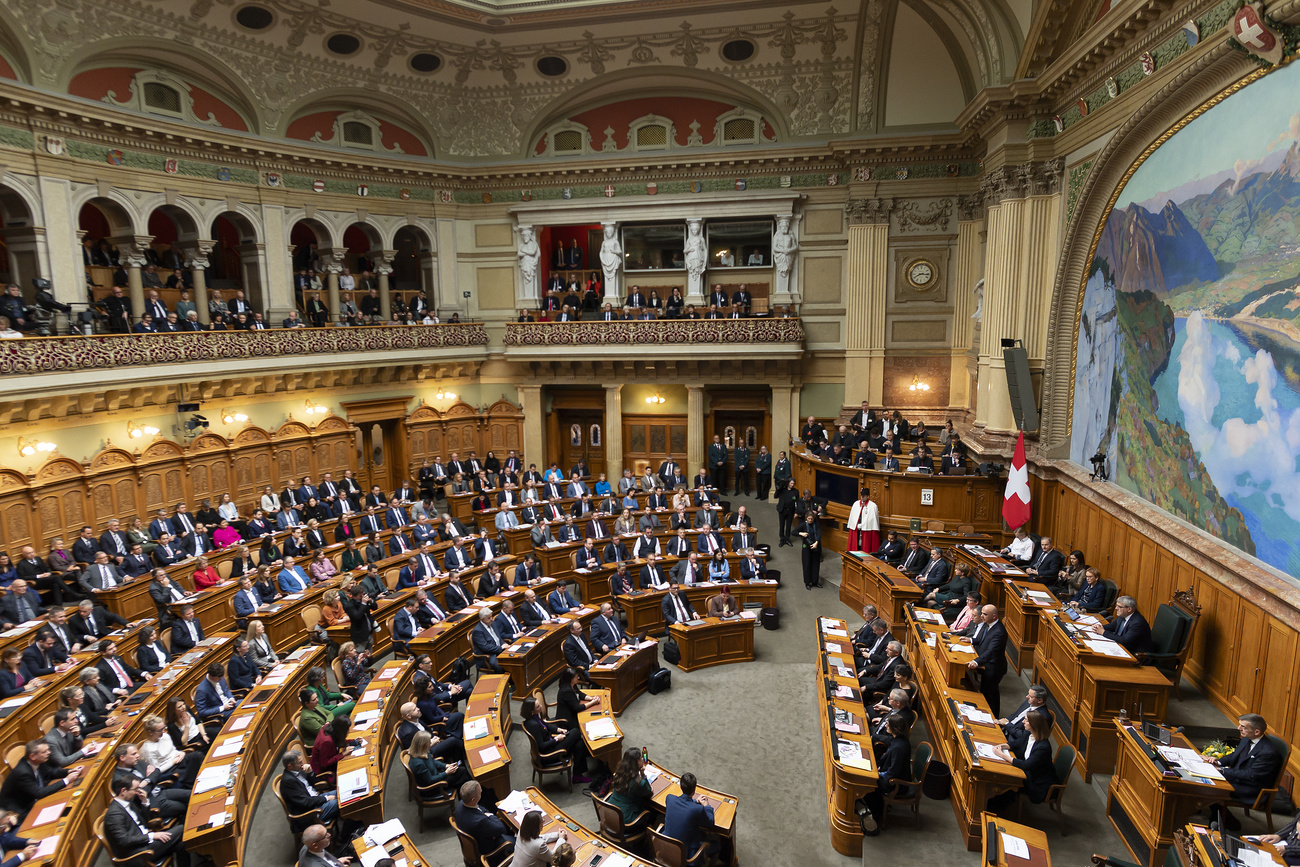This was more than just a Swiss Federal Council election

The Swiss parliament has elected a new member of the governing Federal Council, as well as a new federal chancellor. Business as usual? No, the result will affect four crucial policy areas.
The Swiss – EU debate
Background: In 2021, the Swiss government abruptly and unilaterally broke off ongoing framework agreement negotiations with Europe. This has severely hindered relations between Brussels and Bern. In recent months, the relationship has been able to normalise through technical discussions. Progress has also been made in terms of the substance of these talks.
These exploratory talks have now come to an end. The Federal Council wants to draw up and adopt a European Union (EU) negotiation mandate. However, in the past few years the Swiss government has been dominated by a faction opposed to closer ties with the EU, which has put the issue on the backburner.
The outgoing federal councillor Alain Berset, of the Social Democratic Party who started out as pro-EU, has sided with the opposition in recent years, according to several sources familiar with federal politics. What is the reason for this change of heart? Berset is closely linked to the Swiss trade unions. These trade unions are currently fighting against wage dumping and are demanding more concessions from Brussels.
Election impact: The new Federal Councillor Beat Jans was previously a member of the Basel City cantonal government. Basel City borders Germany and France, making his home canton the most European city in Switzerland and positioning Jans as knowledgeable with the details of the complex “Switzerland-EU” dossier as a result of his canton’s direct proximity and connection to EU member countries. In an interview this week, Jans said, “In the EU dossier, the Federal Council should have done more to ensure that the special-interest groups find a solution.” Now he can take on this task: his professional and political background gives him sufficient credibility on both sides of the spectrum – both with business and trade unions.
Beat Jans appears before the parliamentarians who have just elected him:
SWI swissinfo.ch analysis: So far, the trade unions have managed to influence the Federal Council’s European policy in their favour. However, this may now change. It could well be that in the future, the Federal Council could instead influence trade unions in such a way that a deal with Brussels becomes a possibility.
Cooperation within the Federal Council
Background: In the past few years, the Swiss government has shown dysfunctional traits. It is not political disputes that have made internal cooperation difficult, but instead it has been strategic and sometimes even personal animosities that have caused the most rifts.
In particular, a flood of leaks during the Covid-19 pandemic period severely damaged trust within the government. A parliamentary investigation and subsequent report described a “damaged working atmosphere”. The constant leaks were “corrosive” to the internal structure. Disagreements over the distribution of departments had caused a negative atmosphere and mistrust at an interpersonal level.
Politicians within the federal government described an inflexible and insecure government characterised by trench warfare in which the Federal Chancellor often had to take on the role of a mediator. Not the kind of leadership one would want during a crisis.

Election impact: Alain Berset, the member of government at the centre of the so-called coronavirus leaks, has stepped down. Confidential government information from Berset’s department was regularly leaked to the media. An investigation was unable to prove that the interior minister himself was responsible for the leaks. However, some political commentators said that Berset bailed out to escape further consequences.
Now the governing group is being fundamentally renewed. Along with a new federal councillor, a new federal chancellor is also adding a new face and creating a chance for a fresh start. At the same time, problematic constellations remain. In particular, the position of Foreign Minister Ignazio Cassis remains feeble, while that of Finance Minister Karin Keller-Sutter remains dominant. Cassis has rarely gained majority support in the Federal Council for his foreign agenda on issues such as the European Union, Ukraine or neutrality. On the other hand, Keller-Sutter regularly scores points with her strategic skill.
SWI swissinfo.ch analysis: Asymmetries remain and while they have always existed, the possibility of a new, more cooperative way of working is looking more likely.
The Swiss political system
Background: While the Swiss political system is known for its stability, this often translates to sluggishness. This system is not conducive for revolutions. To ensure the political system remains this way, three unwritten rules ensure the federal government remains predictable.
The first rule is the so-called, long-standing “magic formula”. As early as 1959, the four strongest parties agreed that government posts would be allocated in a ratio that corresponded to their respective strength in parliament. This arrangement between the strongest parties has remained unchanged since the 2003 parliamentary elections. The second rule is that the candidates proposed by the parties are elected, while others are not. The final rule does not allow parliament to vote out members of the government.
These three unwritten rules are based in common understanding and have guaranteed a certain harmony. There is no back-stabbing or deceit between parties. Each party can rely on this non-aggression pact.

Election impact: The parliamentary elections this past October have already brought about a shifting in the Swiss majority. Although this shift was only within a one percentage point range, it was significant enough for the current and long-running “magic formula” arrangement to become a point of discussion once again. In the end, the election mostly followed the script despite a few disruptive manoeuvres and thought-provoking tweaks. However, the three unwritten laws once again withstood the burgeoning desire for a coup.
SWI swissinfo.ch analysis: A need for change has become apparent and the discussion has been launched. Switzerland’s stable system is surprisingly quick to grasp even pipe dreams of a revolution and can integrate them sustainably, or in other words: “Swissify” them. Expect evolution instead of revolution.
E-Voting
Background: In Switzerland, there has been a fundamental political inclination to build an e-voting system. However, despite majority political support, the project was halted in 2019 due to security concerns. Cantons are responsible for organising elections and votes and the task of undertaking e-voting was too much of a challenge.
Two years ago, the federal government took over coordination of the e-voting project. This was a pivotal moment which then allowed e-voting to once again gain momentum. The outgoing federal chancellor Walter Thurnherr was responsible for this. During his time in office, security concerns were addressed, and a new trial phase was launched in 2023. Four cantons are currently taking part in the trial and the aim is to expand the trial to more cantons as the know-how for the process grows.
Election impact: A federal chancellor in Switzerland has no executive power. The post holder heads the staff of the federal government, but is also responsible for a functioning Swiss direct democracy at the federal level. So far, Walter Thurnherr set the pace for e-voting. Digitisation was a personal priority for him. Thurnherr’s successor is therefore also a decisive for the future of e-voting.

The new federal chancellor Viktor Rossi has worked in the federal chancellery since 2010 and has been vice-chancellor since 2019. He is a trained chef and is already highly regarded as a leader in the federal chancellery. Rossi wants to ensure stability and “consistently propel” the digitalisation of the administration.
SWI swissinfo.ch analysis: With Viktor Rossi, Switzerland’s e-voting project has the best possible champion. This is good news for the Swiss Abroad.

In compliance with the JTI standards
More: SWI swissinfo.ch certified by the Journalism Trust Initiative









You can find an overview of ongoing debates with our journalists here . Please join us!
If you want to start a conversation about a topic raised in this article or want to report factual errors, email us at english@swissinfo.ch.